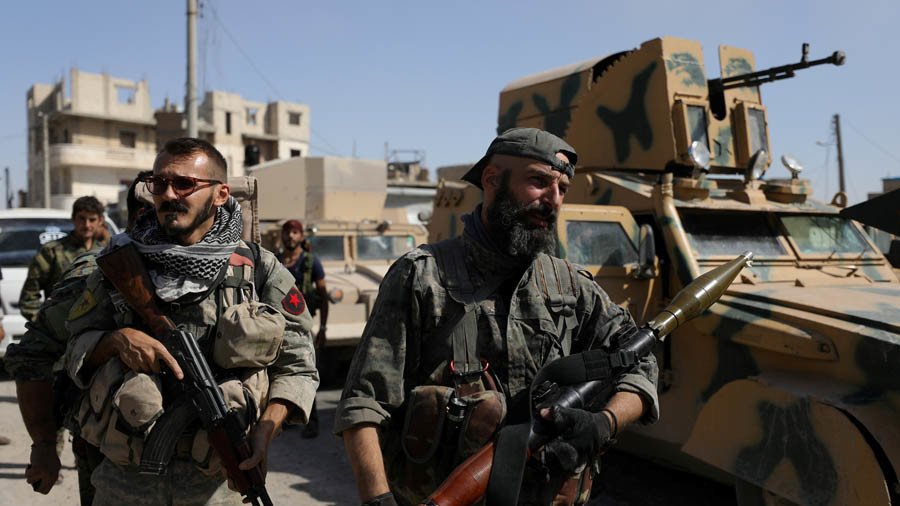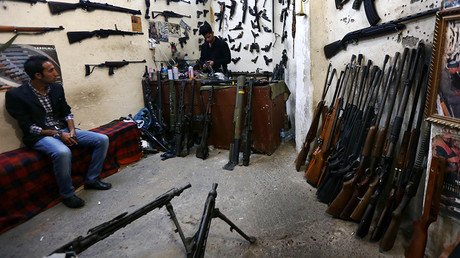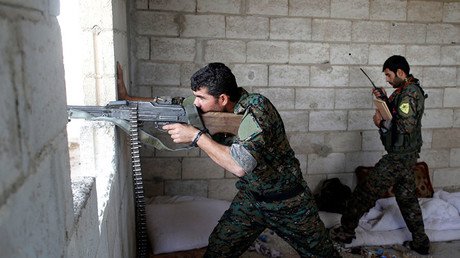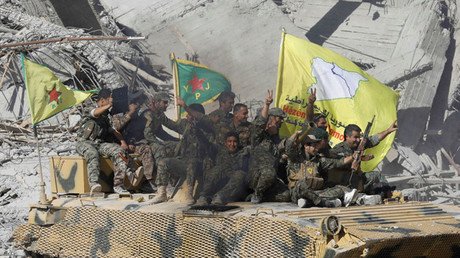US backing of SDF border guards could prolong Syria war for years

The US may think a new strategy backing the Kurds in Syria with 30,000 border guards will settle old scores. In fact, it might push Turkey’s relations with Russia beyond breaking point. And who exactly are these ‘new recruits’?
Hopes of real peace in Syria received a set back by the recent US backing of a ‘border police’ which is expected to be made up of SDF forces (largely Kurds) to man Syria’s borders with both Turkey and Iraq.
The US-led coalition has announced it is helping to create a new Border Security Force that is expected to be comprised of up to 30,000 people. Syrian Democratic Forces (SDF) veterans will make half of the unit, while the other half are yet to be recruited.
The move by the US at least reveals now what America’s longer-term strategy is in Syria and which relations it is prepared to sacrifice in the process. It also shows that the US never keeps its promises. Washington’s promises to Turkey about abandoning its support for the YPG was really just a ploy to buy time with Erdogan. And remember those promises to take the guns back off the Kurds?
Without even looking too closely at the threat of such ‘border forces’ who, some have argued may allow many Islamic State (IS, formerly ISIS) fighters to move from Iraq into Syria, it would be prudent to observe what price the West or, more specifically, Washington pays by endorsing the move. Turkey’s role in the war in Syria until this point has been relatively limited and late in the game, given its proximity and its military capabilities. Even in Idlib, a border province of great interest to Ankara, its military fortitude was somewhat restrained and its troops appeared more comfortable in the role of humanitarian peace keepers rather than a great army about to slaughter terrorists.
But the gloves may well have to come off when President Recep Tayyip Erdogan feels that not only are his own forces coming under increasing pressure by these new ‘border’ units – which he will assume are partly made up with troops aligned to the PKK – but also that Trump’s support for Turkey was always folly. It will be a real turning point for Ankara as the peaceful and diplomatic subterfuge which so far has kept Turkey out of a full-scale battle with the YPG, or even Assad forces for that matter, will expire. Trump is effectively going to create a new military conflict in Syria without actually placing US boots on the ground – which is probably why he has backed such a plan in the first place.
Your terrorists against mine?
At a glance it looks smart – like the Tomahawk attack on the Assad Air Force base – as is it makes a statement to the Assad regime and also irks the Turks. But there is a banal hypocrisy here at play both by the Americans and Turkey. Both sides seem to be indulging themselves in supporting or aiding hardcore terrorist groups in Syria, as both have an agenda to unseat Assad, even to this day. We saw how Turkey hardly did anything about the HTS (an Al-Qaeda umbrella coalition of extremists in Idlib) which at the outset some Erdogan supporters claimed his own forces would destroy. And hundreds, if not thousands of IS fighters were constantly given free passage in Raqqa, Deir ez-Zor and Mosul in Iraq by the US coalition. This move stunned many and drew the opprobrium of even Western media, whose journalists often witnessed it for themselves.
But both the Americans and their allies – and the Turks – are going to be kept busy if the border guard ruse actually happens, as the Erdogan response about “playing with fire” is probably a firm ultimatum. And the Assad regime may well feel that it can profit from it as many have questioned when is the right time for the Assad army to make its move on the last enclave which it believes it can take, with a fight.
Yet few can also doubt now that both Turkey and the US still yearn to topple Assad, which is really what this latest gambit is about. Both Turkey and the US have a long-term plan to overthrow Assad but, in the meantime, might end up fighting one another before they get to the Syrian leader. There is also this old idea which appeals to America more than Russia, which is that a new Syria should be divided up into regions as part of an acceptable ‘spoil of war’ from a US that failed to reach its goals in Syria. Russia opposes this and is against the recent move to back the border guards for this very reason, as Moscow feels that further US escapades with the SDF will create such a threat.
The Balkanization of Syria did not get the backing of Russia and the US will see this as a minor victory if the SDF is able to create a third axis (Turkey) which will turn its back on Assad forces in preference for a victory over the YPG. But perhaps more importantly Russia opposes Turkey going rogue in the region and what we are witnessing is the demise, once again, of relations between Ankara and Moscow.
Turkey’s Idlib venture strained relations to breaking point, following a recent attack on a Russian Army base in Syria, believed to come from ‘rebels’ probably aligned to the Turks and also the ticking time bomb of the Syrian army advancing into Idlib itself, which the Turkish foreign minister pointed out recently.
The problem Turkey has is that, although it sees Russia as a potential ally against the PYD in northern Syria, Ankara’s longer-term goals are at odds with Moscow, and Erdogan’s bold ambitions to soldier on to Afrin and take a symbolic Kurdish stronghold may push Moscow over a red line.
Ahmet Kasim Han, a professor of international relations at Istanbul’s Kadir Has University agrees and says Ankara Moscow relations are already “crumbling” over Idlib.
“The foremost strategic goal for Russia and the Bashar al-Assad government is complete control of Syria’s coastal-belt region and neither would ever allow Idlib to remain in opposition control and endanger that” he told Middle East Eye.
There was always a dubious question over why the US was training so many, so-called ‘moderate’ rebels in the east of the country right up until just recently when the Deir ez-Zor province was being taken from both sides – Assad’s forces and those of the mainly-Kurdish SDF group – in the last days of the war. Was the US planning to use its newly-trained soldiers to support the Kurds and their Arab contingent, or did it have other, plans for the future?
If we are to assume that ‘border force’ is a euphemism for a new regiment – perhaps even made up of Al-Qaeda fighters and anti-Assad ‘rebels’ trained by the Americans – then we could be looking at a new type of regional war in Syria which pitches one group (and their freelance jihadists) against another. As we have learned, those who control the flows of extremists across its borders, wields a great power on the battlefield.
The statements, views and opinions expressed in this column are solely those of the author and do not necessarily represent those of RT.

















